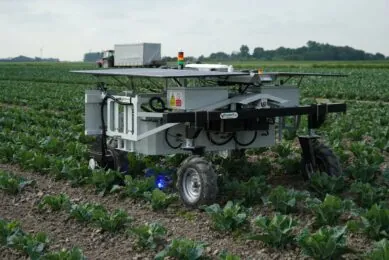Governments must change rules of automation

It is inevitable that the food production will automate further. That is why governments need to adapt the rules for using robots to this new reality, that will lead to more productivity and more sustainability.
Automation is still in its early stages, but the developments move fast. The Global Future Farming Summit in Wageningen, organised by Misset and Wageningen UR, proved as much.
Robots can already do a lot on a small scale, such as picking strawberries or peppers. Spraying robots that control ground keepers in young beet roots do so successfully, just like sowing a plot with minimal soil pressure.
Robots still very expensive
However, the big break is not there yet. Robots are still very expensive and sowing, picking or spraying automatically requires an enormous amount of computing power. Equipping every robot with its own computer is too expensive and connecting it to a large cloud computer is often difficult, because it will not be fast enough in rural areas.
Text continues underneath image
However, the advantages of automation are so unmistakable that the development towards autonomous machines is unstoppable. Staff is no longer needed for heavy and monotonous work. Robots are lightweight and productivity will increase.
Robots can only work under supervision, but they are meant to work autonomously
That is why governments needs to adapt the rules now and not interfere with future developments. Right now in the Netherlands for instance, robots can only work under supervision, but they are meant to work autonomously. Growers also need to take this into account.
Huge impact
The transition to automation has as much impact as the transition from hand-milking to milking with robots or using a tractor instead of a horse. The essence of agriculture does not change, which is producing food and raw materials. The nature of the job however, will change spectacularly. Only the ones that respond to that will remain. A growing number of farmers cannot wait. The government cannot stand in their way.
Join 17,000+ subscribers
Subscribe to our newsletter to stay updated about all the need-to-know content in the agricultural sector, two times a week.



